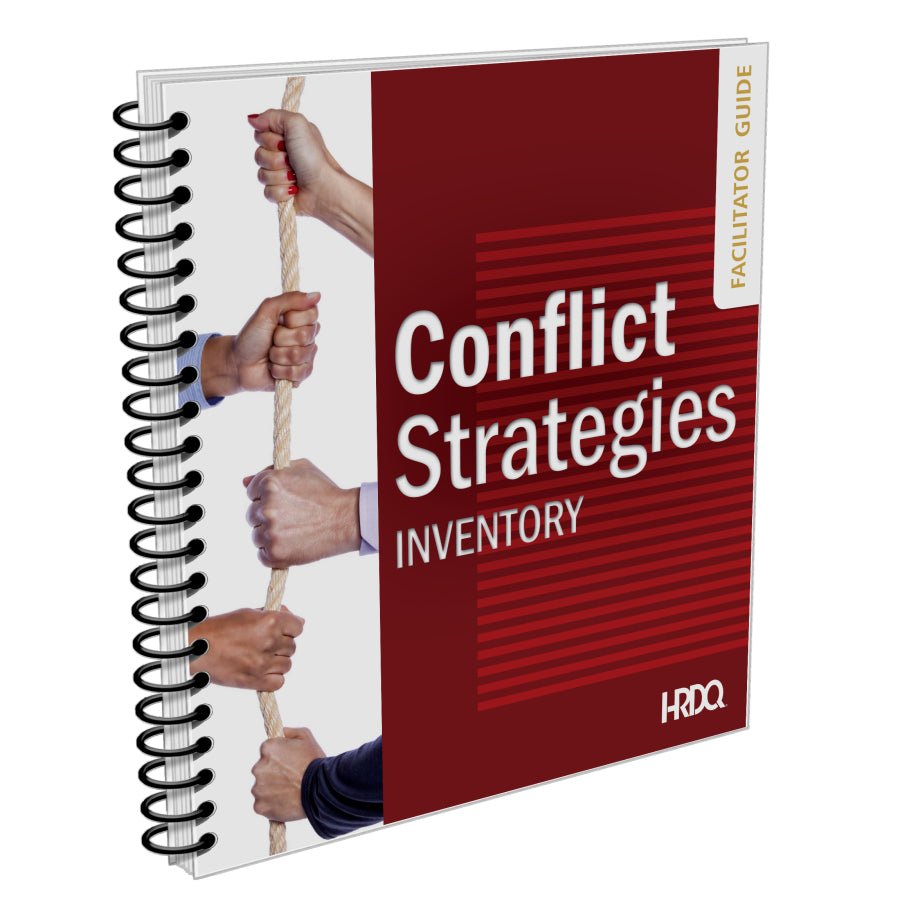Share
How to Recognize Effective Crisis Communication Strategies
Bradford R. GlaserCrisis communication helps protect your organization's reputation and trust. It operates through clear and direct messaging and quick action.
When crises strike, the people who are prepared can get through the chaos and also protect their brand. Strong crisis communication can turn challenges into opportunities. Three things that matter for success are speed, transparency and also consistency.
Your team's readiness, the communication channels, and the stakeholder expectations all play a big part. These parts may shape or even break your response. A well-structured communication plan is a big part of the process. These strategies will allow your organization to manage any crisis with confidence.
So let's get started. We have quite a bit to cover.

- Discover preferred conflict strategies
- Effectively mitigate conflict
- Self-assessment and workshop
Table of Contents
Speed and Response Strategies
Every single minute matters when disaster strikes. Your organization will probably find itself completely swamped with negative press and angry social posts if you wait even a little too long to respond. Your team needs to get ahead of the story during that big first hour.
Most businesses eventually realize they should be moving faster during a crisis. Yet some leaders pause to speak up until every single detail is completely confirmed. While this might feel safer or protected, it usually makes things much worse.
People are expecting to hear some updates, and they won't wait hours for your response. Past examples show how some businesses have hurt their own crisis management work. You might remember an airline staying silent after a viral video spread – or a tech company trying hard to hide a data breach.
The longer these kinds of businesses stay completely silent, the more damage they all face. You don't actually need the facts just to start talking to your audience. A simple "we see what's happening and we're looking into it" message can help buy you some breathing space. Just make sure that people know you're paying attention here and are taking steps to fix the situation.

When everything moves at lightning speed in this connected world, news travels fast. People form strong opinions in mere minutes. Your lawyers might still be checking every single word of your prepared statement. However, thousands of comments are already starting to flood social media. The story takes shape if you join or even if you don't.
Businesses do their best to plan this sort of environment. They usually run practice drills and have pre-written messages ready to go. Everyone already knows who needs to immediately jump on the emergency call. The whole response can become second nature when handled through regular practice.
Modern technology helps you find problems early, too. Social media monitors and news trackers can warn you about problems long before they blow up. The sooner you catch these kinds of problems, the more options you'll have to manage them.
Crisis mode gets your heart racing and can cloud your thinking. Your phone won't stop buzzing. The boss also wants updates all the time. Reporters are already starting to ask lots of questions. A strong plan actually helps in these tough moments.
The public can usually see silence as either guilt or incompetence. Even if your team is working intensely behind closed doors, silence always sends the worst possible message. Without actual updates from you, people will continue to assume the absolute worst.
Transparency for Trust
When you're in a crisis, you might feel tempted to downplay the problems or hide uncomfortable facts to protect your organization's reputation and avoid panic. This natural impulse usually comes from wanting to protect your company from harm.
When you keep the information under wraps, it almost always makes things worse. Look at what happened with Tesla's data breach. The company dragged its feet in responding after two employees leaked sensitive data. That incident affected around 75,000 people, and this delay sparked speculation and rumors on social media.
Problems will probably snowball into even bigger problems later when you try to forget them now. The real story usually finds its way into the light sooner or later. A person who wasn't honest with you – maybe they gave you half-truths or dodged around serious facts – probably left you feeling skeptical about everything else they said.
Crisis communication works in the same way. Your organization can stay in control of the story through clear and honest communication. Trust in your services builds up when you speak up first about the problems. People are less likely to believe the random rumors or speculation floating online.

Organizations that hide serious information during a crisis usually face serious legal consequences, too. Businesses end up paying massive fines and penalties for withholding facts from the public. Some leaders have even had criminal charges for keeping information from stakeholders.
Transparency might feel risky for you. Nobody enjoys admitting when something goes wrong. But being open about problems can give your organization room to try to solve them. This shows stakeholders you care more about honesty than keeping up appearances.
Your crisis communication needs steady messaging across every channel. Different departments sending out conflicting information only worsens the confusion and makes people think about what else you could be hiding.
Clear and Consistent Communication
Mixed messages during emergencies might put some lives in danger. Three separate sets of evacuation orders during a hurricane could leave people uncertain about whether they should leave or stay put.
Clear communication can sometimes make the difference, even though fancy words might still feel great at times. Tough corporate language in company memos can sometimes leave people confused when they have a hard time understanding. It feels more like decoding a secret message instead of actual information.
Pros will often use tough terms without thinking too much about it. Your doctor might tell you about "presenting symptoms" instead of just plainly saying "signs you're sick." Weather reporters love saying "precipitation" when they could just say "rain."

Different audiences need different ways to better receive information. But the core message shouldn't change. Students might like to get updates through Instagram, while parents would probably want emails.
You can adjust how to give the message without ever changing its meaning. A campus emergency alert still has to get across the same message, whether it's on a tweet or in an official statement. Messages have to be crystal clear in order to save lives during health scares, natural disasters, or security threats. People won't have time to look up what "shelter in place" means when immediate action is needed.
Corporate tough language during crisis situations might often leave people feeling confused and frustrated. Some businesses responded to COVID-19 with phrases about "putting strategic protocols." Most people just wanted answers about masks or staying home. The simplest words will usually work the best.
Build a Crisis Team
A strong crisis team helps you to manage emergencies before they start to spiral out of control. You need some level-headed and capable people who can stay calm and work well together when situations get rough. Your goal is to find people with real crisis management skills and the right mindset.
The best results often come from pulling team members from different departments of your company. Someone from your legal team will find these compliance problems. Your IT people will help to protect you from cyber threats and data breaches. HR team members will also make sure employee problems stay in focus during your choice-making.
Look for an experienced executive who knows your company well and can make tough calls faster without losing their cool. This person also needs to be skilled at explaining tough situations to groups of people. These practice runs also help to show you where your emergency plans might need changing before a real issue hits.

Regular practice sessions help your crisis team's success. Your team can become more unified when it runs through different emergency scenarios. Some high-ranking executives might crack under stress.
At the same time, a middle manager might turn out to be your best crisis leader. Different team members bring ideas that help strengthen your crisis response. Your IT director understands tech threats closely, inside and out.
HR managers know how to keep your employees feeling protected during tough times. These different perspectives work together to create an emergency plan. Businesses that manage crises well often depend on this kind of balanced strategy.
Single Spokesperson Role
A single spokesperson will help to make your organization's message clear and steady during a crisis.
Different company executives can usually give conflicting statements about the same problem. One person might claim everything is fine, while another admits they're still fixing problems – this sends your audience into a spiral of confusion and damages their trust in your company. The public learns to find their communication style and develops a sense of what to expect.
A designated spokesperson can become a familiar and trusted figure that people depend on in tough moments. People look for reliable information from someone they trust instead of a parade of unfamiliar faces giving different accounts of events.
Your communications team works behind the scenes to help find facts and make good replies. A single person delivering these messages builds consistency and public confidence. This spokesperson can then become your organization's steady presence throughout the crisis.

Organizations have learned that multiple voices cause mixed messages. When you might have serious health emergencies or product recalls, businesses with one primary spokesperson protect their credibility. People who allow multiple representatives to speak often end up with angry customers who hear different information from different sources.
News outlets also like working with a single point of contact. Your designated spokesperson helps journalists get accurate information faster and builds media relationships. When reporters know who to contact, they're less likely to depend on unofficial sources that could spread misinformation.
Recent serious corporate crises show that the most successful recoveries involved one steady voice leading all communications. These spokespersons kept messaging steady, admitted mistakes when necessary, and provided regular and clear updates to all stakeholders.
Public Feedback Insights
Your response time determines your success in crisis management, and social media can spread the news at lightning speed. A slow response could turn any small problem into a PR nightmare. You'll need to actually talk with some people and address their problems because your organization can build trust and credibility by connecting with your audience.
It helps when tough situations pop up. You'll have to manage some angry comments, and you'll also need to manage those trolls who like spreading false news. But staying quiet will only make things explode in your face.
Your honest and quick response can help stop people from freaking out. Rumors can spread like wildfire in life. Someone shares incorrect information, and before long, everyone thinks it's legitimate.
This same thing happens at warp speed online. You'll have consequences if you wait too long to help with problems. Organizations know they need to get started with conversations head-first, their eyes glued to social media, and acting when the second is right.

No hiding behind elaborate corporate language here - they talk to people just like regular people would. Transparency doesn't mean you have to share all your secrets. But you should be clear about what you can and can't tell people about.
People usually expect the absolute worst when organizations dodge questions or give vague answers. Direct talk is what builds confidence and trust. Businesses do get nervous about dealing with negative comments online.
They worry they'll add fuel to the fire or draw attention to their challenges. But staying quiet leaves an empty space that others will fill with their own fabricated stories. Crisis communicators know how timing can change everything.
They know that false stories take root when you wait even a few hours to respond. Once those stories take hold, you'll have an uphill battle to change minds and earn back trust.
Five Cs Framework
A crisis will need a communication and management strategy. Crisis communication experts depend on the Five Cs framework. You can use these principles to help you get through tough situations.
Your first priority is showing real concern. People need to feel your care and your empathy when they're going through a struggle. A supportive response should make others feel heard and understood, just as you'd comfort a friend after a rough day.
Your commitment shows others that you'll stay until the situation improves. Share your action plan instead of making empty promises. Successful businesses show this when they quickly remove defective products from shelves and explain their next steps and services.
Your competency proves you can manage the crisis. People want proof that you have the right skills and resources to face the problem head-on. Share concrete examples of your expertise and track record in similar situations.

When you communicate, being clear matters more than anything else during tough times. Skip technical language and complex explanations. Instead, tell people what's happening and what they should expect in the coming days.
Easy and direct language works best when stress levels are high. Confidence ties everything together. Don't mistake this for arrogance or an unrealistic attitude.
When you share your action plan with authority, it helps to calm fears and naturally builds trust. Recent events show these principles in action. Businesses demonstrated good crisis communication during COVID-19's early days.
The ones that stood out openly acknowledged their challenges, outlined clear plans, and showed care for their teams and customers. They communicated with confidence about what they knew, even when they didn't have the answers.
Communication Saves the Day
A look back at some recent company crises will teach you about how communication actually saves the day. These hard moments can give you an idea about an organization's true values and they also test your relationships with customers and employees.
Your organization could be looking at a big crisis as soon as tomorrow. Now is the perfect time to check if your team knows what to do when things go wrong. When you take small steps to help with your communication, it'll pay off when you run into tough situations in the future.

You need to make sure that every team member knows their job to take action fast. Preparation is a big part of handling any conflict that comes your way. Your team also needs the right tools to manage workplace disagreements before they escalate into bigger problems.
The Conflict Strategies Inventory from HRDQ can help give you some fantastic methods that are based on decades of research. With strategies like finding common ground and working out fair compromises, your team will manage everything from smaller disputes to serious emergencies like pros!




















































